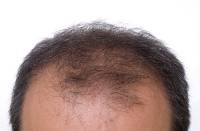If your hair is thinning or falling out, you’re likely to seek out hair loss help in one form or another. Hormones, DHT blockers, growth stimulators, SODs and antiandrogens are medically-oriented and often effective methods of hair loss help. But is there anything you can do on a more basic level combat hair loss and even encourage hair to regrow? The answer is a resounding yes. By making a few simple changes in your life, you’ll be on the way to thicker, healthier hair. Two of the major actions you take are related to nutritional supplements and herbs. Here’s some information on both.
An easy first step you can take for hair loss help is to eat a balanced diet rich in fruits and vegetables. Look for foods and nutritional supplements that include biotin, silicon, copper and zinc. Also important are essential fatty acids, B-vitamins, vitamin C, and vitamin E. In addition, there are herbs that may prove beneficial. Taken together, these substances can provide an optimal environment for hair growth.
Click Here For Hair Loss Help Tips And Facts!
Biotin is essential for hair health and may actually help prevent hair loss. Good sources of biotin are brown rice, soy products, lentils, oats and sunflower seeds. For more hair loss help, silicon aids in hair strength. Oats, leafy green vegetables, bell peppers, soy products and brown rice are foods rich in silicon. Zinc enhances the immune function and may help your body fight off any condition that causes hair loss due to an immune reaction. Nuts and seeds contain zinc, especially pecans, peanuts and sunflower seeds. Other zinc-rich foods are fish, oysters, sardines, seafood, lima beans, mushrooms and egg yolk. Copper deficiency can cause osteoporosis, anemia and baldness. Teamed with zinc, copper may help hair to grow. Foods high in copper include barley, beans avocado, radishes, broccoli, beets, almonds and other nuts, salmon and seafood.
Essential fatty acids are needed for good hair texture and to prevent brittleness and dryness. Fish are the best sources, especially salmon. B-vitamins are important for hair growth. Many foods contain B-vitamins including eggs, whole grains, fish, tomatoes, potatoes, soybeans, dates, raisins, prunes, carrots, spinach, avocados, leafy greens and poultry. Vitamin C will aid in scalp circulation. For vitamin C, eat citrus fruits, strawberries, asparagus, avocados, pineapple, radishes, spinach, mustard greens, watercress and spinach. Like vitamin C, vitamin E helps circulation in the scalp. Foods that contain vitamin E are cold-pressed vegetable oils, dark green leafy vegetables, soybeans, sweet potatoes, watercress, dried beans and peas, and wheat germ. Hair loss help is as close as your refrigerator, if you choose foods high in these vitamins, minerals and nutrients.
Hair loss help can also come in the form of herbs. The herb horsetail is a good source of silica. Zinc can be found in chamomile, eyebright, fennel, nettle, parsley and wild yam. Many herbs contain B-vitamins including chamomile, eyebright, fennel, nettle, oat straw, parsley and peppermint. For vitamin C, look to chamomile, eyebright, fennel, nettle, oat straw, rose hips and peppermint. Herbs that contain vitamin E include flaxseed, nettle, oat straw, raspberry leaf and rose hips.
You should always see your doctor about hair loss because there might be a medical reason like diabetes or thyroid imbalance that’s causing it. But hair loss help in the form of good nutrition and nutritional supplements will compliment any other treatment you may undertake.

